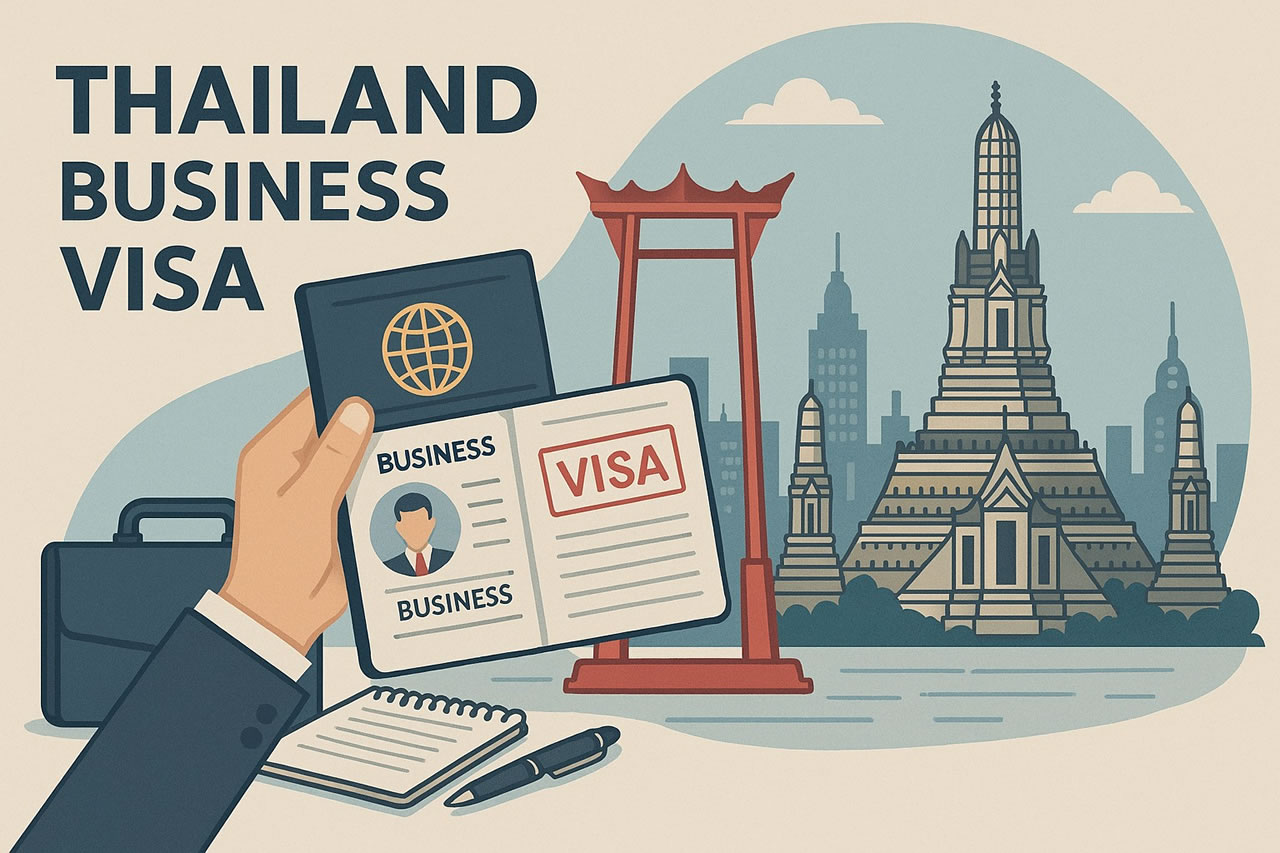If you’re planning to work, start a business, or engage in professional activities in Thailand, the Non-Immigrant B Visa is the standard visa required. This visa is essential for foreign employees, entrepreneurs, and business professionals looking to legally work and operate in Thailand.
In this guide, we’ll cover the different types of Thailand Business Visas, eligibility requirements, the application process, and key considerations to help you navigate your way through Thai immigration laws.
Types of Thailand Business Visas
There are two main types of Non-Immigrant B Visas, each suited to different needs and lengths of stay.
1. 90-Day Non-Immigrant B Visa (Single-Entry)
- This visa is initially valid for 90 days from the date of entry.
- It is a single-entry visa, meaning that if you leave Thailand, the visa will be void unless you obtain a re-entry permit beforehand.
- It is typically issued for individuals seeking employment or setting up a business in Thailand before applying for a long-term extension.
2. 1-Year Non-Immigrant B Visa (Multiple-Entry)
- This visa is valid for 1 year, allowing the holder to enter and exit Thailand multiple times.
- Unlike the 90-day visa, you don’t need a re-entry permit when traveling in and out of Thailand.
- However, you must exit and re-enter the country every 90 days to maintain valid status unless extended to a full one-year stay inside Thailand.
- It is commonly used by business professionals with long-term commitments in Thailand, such as employees of Thai companies and foreign investors.
Categories of the Business Visa
The Non-Immigrant B Visa is issued under two main categories, depending on the applicant’s purpose of stay.
1. Conducting Business (Investment & Business Activities)
- This category is for foreign business owners, investors, and individuals involved in business negotiations, meetings, and other professional activities in Thailand.
- Sponsorship from a Thai company is required, which includes submitting company-related documents during the application process.
- Read the complete roadmap ===> Starting a Business in Thailand: A Practical Guide for Expats
2. Employment (Working for a Thai Company)
- This visa is for foreign nationals seeking employment in Thailand.
- It is necessary to have a job offer from a Thai company, and the employer must provide required sponsorship documents.
- A work permit is mandatory for legal employment—holding a Non-Immigrant B Visa alone does not permit work.
Application Process for a Thailand Business Visa
Applying for a Non-Immigrant B Visa involves multiple steps, depending on whether you’re applying from abroad or within Thailand.
- Submit an application at a Thai embassy or consulate in your home country or a neighboring country.
- Pay the applicable visa fee:
- 2,000 THB for a Single-Entry visa.
- 5,000 THB for a Multiple-Entry visa.
- Wait for processing (typically 5–10 business days).
- Enter Thailand using the visa.
- If employed, apply for a Work Permit at the Thai Ministry of Labor.
- For long-term employment, extend the 90-day visa to a 1-year stay after obtaining the work permit.
Requirements for a Thailand Business Visa
To successfully obtain a Thailand Business Visa, you need to meet specific requirements and submit the necessary documents.
General Requirements
- A passport with at least 6 months validity.
- A completed visa application form.
- A recent passport-sized photo (4×6 cm).
- Proof of funds to show financial stability:
- 20,000 THB for individuals.
- 40,000 THB for families.
- A detailed travel itinerary.
Additional Requirements Based on Purpose
- If applying under the Conducting Business category:
- Official company invitation letter from a Thai business.
- Company registration documents.
- A business plan and objectives.
- If applying for employment:
- Sponsorship letter from the Thai employer.
- Employment contract detailing salary, role, and duration of employment.
- The company’s registration and financial documents.
Important Notes
- All corporate documents must be certified by the company directors.
- Documents should be in Thai or English. If not, they must be translated and notarized.
While not required for the Business Visa itself, many employers and work permit applications expect foreign staff to have valid health coverage. Learn what’s recommended and compare expat-friendly plans in my full Thailand Health Insurance Guide.
Additional Information & Key Considerations
1. Work Permit Requirement
- Holding a Non-Immigrant B Visa alone does not allow you to work.
- A Thai work permit must be obtained separately from the Ministry of Labor.
- Read the complete roadmap ===> Thailand Work Permit
2. Visa Renewal and Extensions
- The 90-day Business Visa requires renewal every 90 days or conversion to a long-term visa.
- The 1-Year Business Visa must be renewed annually.
3. Alternative Visa Options for Business Travelers
- The LTR Visa (Long-Term Resident Visa) is available for high-income professionals and investors, offering benefits such as tax reductions and easier long-term stay options.
- Some business travelers may also find the Thailand Elite Visa to be a more flexible long-term stay option, though it does not permit employment. Get the extensive guide ===> Thailand Privilege Visa – Long-Term Residency in Thailand
4. Pathway to Permanent Residency
- After holding a Non-Immigrant B Visa for at least 3 years, foreign nationals may apply for Thai Permanent Residency, provided they meet the immigration criteria.
Obtaining a Thailand Business Visa (Non-Immigrant B Visa) is essential for those planning to work or conduct business in Thailand legally. The application process requires careful preparation, especially for those applying for employment-based visas. If you’re planning long-term employment, securing a work permit and renewing your visa accordingly will ensure hassle-free stays. For entrepreneurs and investors, Thailand offers numerous opportunities, but staying compliant with visa regulations is key to a smooth business journey.
For help with your Business Visa application it’s highly recommended to consult a Thai immigration expert or legal advisor for personalized assistance!

